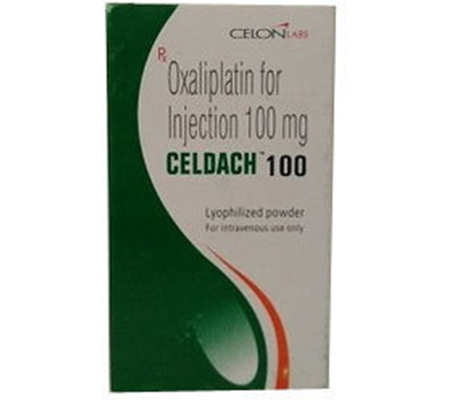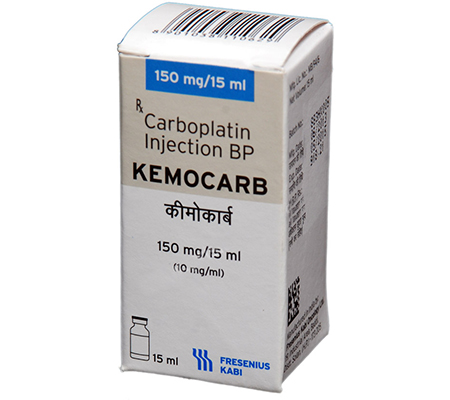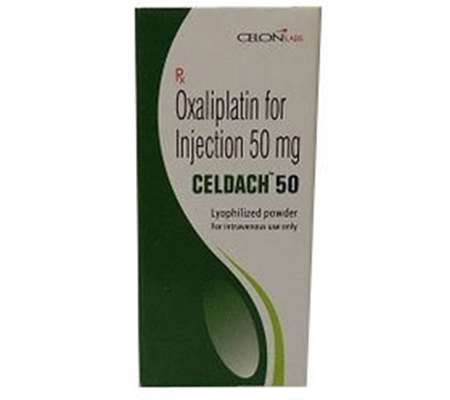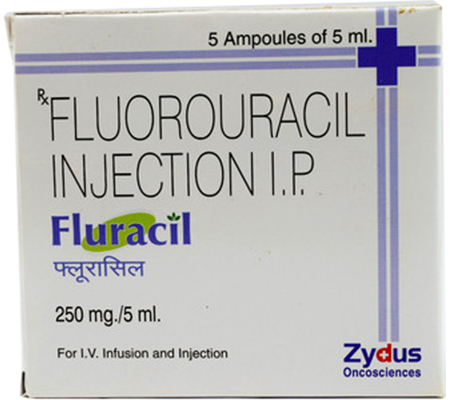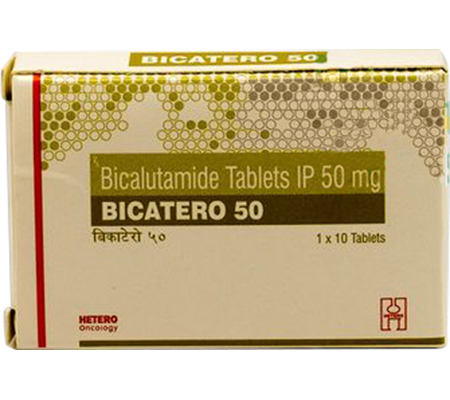Celdach 100 mg (1 vial)
€ 49,84
Free shipping on orders over $300!
- Satisfaction Guaranteed
- No Hassle Refunds
- Secure Payments
Description
Celdach is a cancer medicine that interferes with the growth and spread of cancer cells in the body. Celdach is used together with other cancer medications to treat colon and rectal cancer.
Celdach can cause a severe or life-threatening allergic reaction. Get emergency medical help if you have: hives, itching, sweating; chest pain, warmth or redness in your face, feeling light-headed; sudden cough, difficult breathing; swelling of your face, lips, tongue, or throat.
You should not be treated with Celdach if you have ever had an allergic reaction to oxaliplatin or similar medications such as carboplatin or cisplatin.
To make sure Celdach is safe for you, tell your doctor if you have: kidney disease; liver disease; heart disease, heart rhythm disorder; a personal or family history of long QT syndrome; an electrolyte imbalance (such as low levels of potassium or magnesium in your blood); high blood pressure; asthma or other breathing disorder; a nerve problem; or if you are using a blood thinner such as warfarin.
Do not use Celdach if you are pregnant. It could harm the unborn baby. Use effective birth control, and tell your doctor if you become pregnant during treatment. It is not known whether Celdach passes into breast milk or if it could harm a nursing baby. You should not breast-feed while using this medicine.
Celdach is injected into a vein through an IV. You will receive this injection in a clinic or hospital setting. Celdach must be given slowly, and the infusion can take at least 2 hours to complete. Celdach is given once every 2 weeks. Your doctor will determine how long to treat you with this medicine. You may be given medication to prevent nausea or vomiting while you are receiving Celdach.
Receiving Celdach can make you more sensitive to cold, which can cause numbness, tingling, and muscle spasms. This includes exposure to cold temperature and coming into contact with cold objects. To prevent discomfort, follow these steps: do not inhale deeply when you are exposed to cold air; cover your skin, head, and face when you are outside in cold temperatures; wear gloves when handling cold objects or refrigerated foods; do not run an air conditioner at very cool temperature in your home or car (even during hot weather); do not drink cold drinks or use ice cubes in drinks; do not put ice packs on your body.
Chemotherapy often causes nausea or mouth sores. Do not eat ice chips to ease these discomforts because you will be more sensitive to cold. Talk to your doctor about other ways to treat nausea or mouth sores. You may be given other medications to prevent nausea or vomiting while you are receiving Celdach.
Celdach can lower blood cells that help your body fight infections and help your blood to clot. Your blood will need to be tested often. Your cancer treatments may be delayed based on the results of these tests. Your heart function may need to be checked using an electrocardiograph or ECG (sometimes called an EKG).
Celdach can cause a severe or life-threatening allergic reaction. Some people receiving a Celdach injection have had a reaction to the infusion within minutes after the medicine is injected into the vein. Tell your caregiver right away if you feel dizzy, short of breath, confused, sweaty, itchy, or have diarrhea, chest pain, warmth or redness in your face, or feel like you might pass out.
Get emergency medical help if you have signs of an allergic reaction to Celdach: hives; difficult breathing; swelling of your face, lips, tongue, or throat.
Call your doctor at once if you have: increased sensitivity to cold temperatures and cold objects; numbness, tingling, or burning pain that interferes with daily activities; severe or ongoing diarrhea or vomiting; confusion, change in mental status, vision problems, seizure (convulsions); pain or burning when you urinate; easy bruising, unusual bleeding (nosebleeds, bleeding gums); sudden chest pain or discomfort, wheezing, dry cough, feeling short of breath; pain, redness, swelling, or skin changes where the injection was given; dehydration symptoms – feeling very thirsty or hot, being unable to urinate, heavy sweating, or hot and dry skin; heart problems – headache with chest pain and severe dizziness, fainting, fast or pounding heartbeats; liver problems – nausea, upper stomach pain, itching, tiredness, loss of appetite, dark urine, clay-colored stools, jaundice (yellowing of the skin or eyes); muscle problems – unexplained muscle pain, tenderness, or weakness especially if you also have fever, unusual tiredness, and dark colored urine; nerve pain – jaw or chest tightness, eye pain, strange feeling in your tongue, problems with speech or swallowing; or signs of infection – fever, chills, sore throat, mouth and throat ulcers, pain when swallowing, cough with mucus.
Common Celdach side effects may include: nausea, vomiting, diarrhea; numbness or tingling; infections, unusual bleeding; abnormal liver function tests; mouth sores; or feeling tired.
This is not a complete list of side effects and others may occur. Call your doctor for medical advice about side effects.

